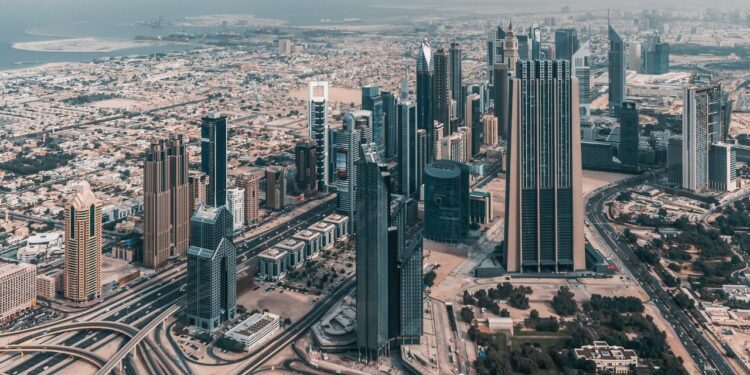- Actions are being undertaken by Gulf Cooperation Council (GCC) leaders to propel a transition towards alternative sectors such as finance.
- The rapid growth and surplus of spending cash in Middle Eastern economies has allowed GCC nations to utilize very little debt compared to other more developed countries.
- Recent legislative changes further contribute to the GCC countries’ appeal as favorable destinations for international companies.
In the wake of a global pandemic, financial dynamics are shifting around the world. It only makes sense that areas that are now the largest hubs for financial activity have the potential to change dramatically. One area that will likely emerge as a primary financial center for companies in the future of work is the Middle East.
Why the Middle East?
The discovery of oil reserves in Saudi Arabia occurred in 1938, followed by the first instance of crude oil exportation in 1939, which signified a momentous turning point in the kingdom’s economic transformation. Over the subsequent thirty-year period, other Gulf Cooperation Council (GCC) member states, including the United Arab Emirates (UAE), Bahrain, Oman, Qatar and Kuwait also embarked on their oil exportation journey, leading to an explosive growth generated by their access to this globally essential commodity, used for diverse energy applications.
Oil production and distribution operate as profit-driven businesses, particularly evident within the political structure of the six GCC countries which represent the oil-rich Middle East. Profits derived from this industry are channeled into the hands of ruling families within their respective governments. However, these leading oil exporters are well aware of the need to reduce their reliance on oil and fossil fuels for a variety of environmental, economic, and political factors. As such, both Saudi Arabia and its neighbor, the UAE, are scaling up their involvement in renewable energy projects and the electric vehicles sector.
Actions are being undertaken by GCC leaders to propel a transition towards alternative sectors such as finance, which serves as the ideal conduit for these nations to sustain their large-scale growth initiated in the 1930s.
The finance industry is a highly suitable avenue for two key reasons.
- The wealth amassed from oil production provided the leadership of these monarchies enough financial resources to invest in various financial industries including asset management, investment services and other financial services.
- The Middle East has a strategic geographical location situated at the crossroads of Europe, Africa, and Asia that make it a very logical trade hub for other commodities besides oil such as tourism, agriculture, and various other goods.
These dual factors create an opportunity for the Middle East to play a more relevant role as a financial center for the future of work, surpassing countries like Portugal, Morocco and Australia. If you compare these factors to other economically significant countries globally, you’d find that none of them have these two competitive advantages at the same level as the GCC nations.
The Debt Factor
In addition to these two competitive advantages, the rapid growth and surplus of spending cash in these economies have allowed GCC Nations to utilize very little debt compared to other more developed countries. The debt to GDP ratio of GCC Nations is around 20% — it is over 100% for countries like the United Kingdom and the USA, and over 200% for countries like Japan. This increases the opportunity for GCC countries to leverage their GDP to receive or borrow more investment capital, adding to the first competitive advantage of being a relatively cash-rich economy.
It comes as no surprise that Bahrain and other GCC countries were ranked the number one place for startups to foster and grow. It is also no surprise that Saudi Vision 2030 includes leveraging Saudi Arabia’s large economy, remarkably low debt to GDP ratio, and abundant cash reserves to fund government initiatives, invest in human capital, and generate strategic, politically advantageous partnerships with big players like China, the USA and India.
The Appeal for Businesses
Combining these nations’ economic history with their competitive advantages, coupled with policy choices such as low taxes such as the availability of free zones, enhances their attractiveness as financial centers for the future of work. Recent legislative changes, such as the UAE allowing non-nationals to open onshore businesses without local partners, further contribute to their appeal as favorable destinations for international companies.
UAE and Saudi Arabia free zones laws designated parts of land that are technically offshore so that older laws don’t apply to companies established in these free zones. This has allowed governments to retain important pieces of law, but create zones where international companies may be more comfortable opening up a business.
Obstacles to This Future
The Middle East is not without its obstacles; some have pointed out a need for elevated civil rights for inhabitants of these countries. The region can be somewhat politically volatile because it has many different factions within close proximity to each other. Examples include the current war with Yemen, and the political spat between Qatar, Iran, Saudi Arabia and the UAE.
The GCC region houses incredibly diverse and complex religious relationships that possess long-standing histories with each other. Amidst the evolving dynamics in the Middle East, the region is on a time clock to successfully move off of oil. In pursuit of this goal, large economies like the US and Europe are making significant investments to become less fossil fuel dependent. As global fossil fuel consumption declines more rapidly, the GCC’s revenue streams and competitive advantages may be threatened.

 Dr. Gleb Tsipursky – The Office Whisperer
Dr. Gleb Tsipursky – The Office Whisperer Cat Johnson – Coworking Marketing Maven
Cat Johnson – Coworking Marketing Maven Angela Howard – Culture Expert
Angela Howard – Culture Expert Drew Jones – Design & Innovation
Drew Jones – Design & Innovation Andrea Pirrotti-Dranchak – Competitive Advantage
Andrea Pirrotti-Dranchak – Competitive Advantage Jonathan Price – CRE & Flex Expert
Jonathan Price – CRE & Flex Expert Jeremy Fennema – Tech Innovation Alchemist
Jeremy Fennema – Tech Innovation Alchemist







